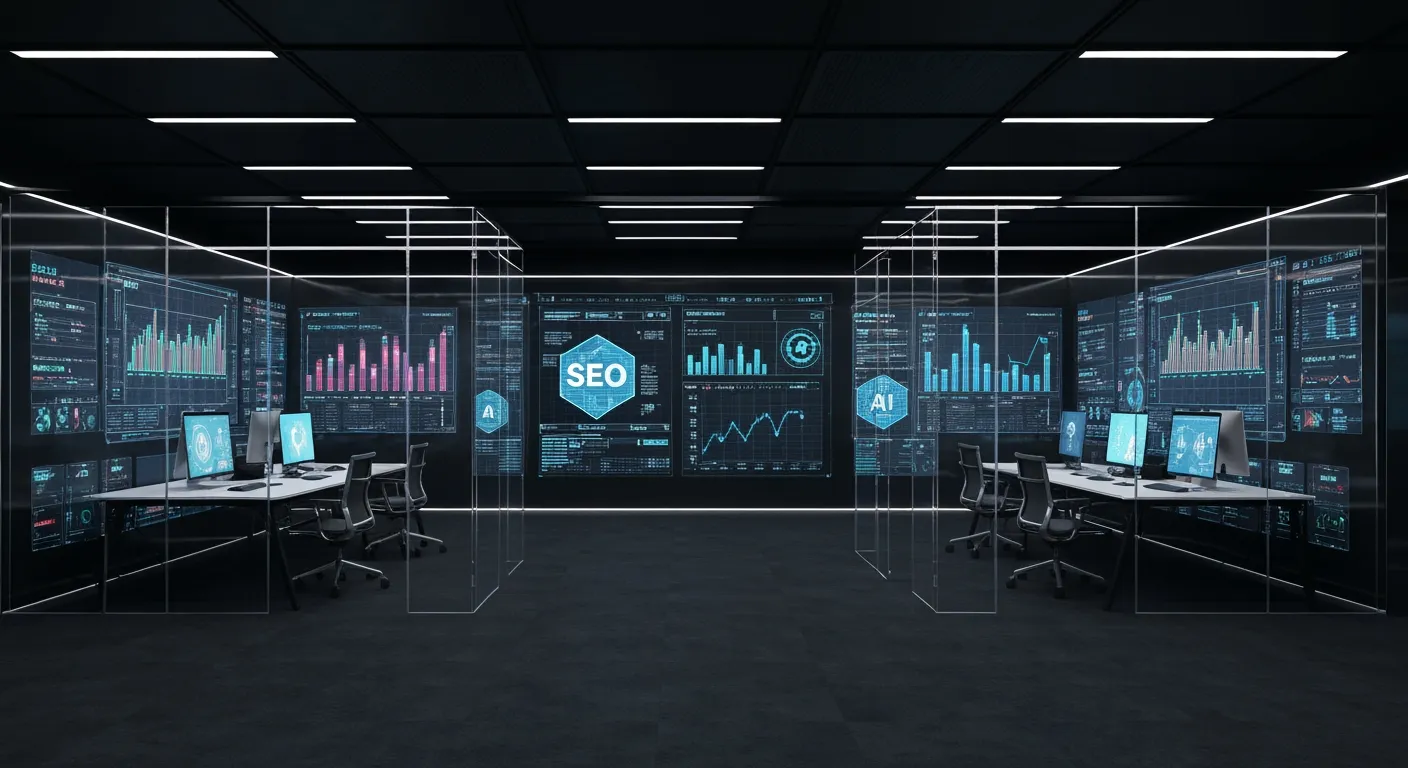Using AI to Predict SEO Trends and Adjust Strategies
Harnessing AI to Revolutionize SEO Forecasting and Strategy Evolution

Introduction to AI in SEO: A Paradigm Shift
Artificial intelligence is fundamentally transforming how SEO professionals predict trends and adapt strategies in an ever-evolving digital landscape. This article explores the integration of AI in monitoring search engine developments, optimizing content, and maintaining competitive advantage amidst rapid algorithm changes. We delve into the tools, techniques, and best practices that empower marketers to leverage AI effectively, ensuring their SEO strategies remain responsive, data-driven, and aligned with future search behaviors.
AI Impact on SEO - Everything You Need to Know
Discover the AI impact on SEO and what it means for your strategy today. Josh explains: ✓ AI search algorithm impact and what's changing in ...
AI's Role in Predicting SEO Trends and Search Engine Evolution

Predicting SEO trends and the future direction of search engines is significantly enhanced by artificial intelligence. AI develops these predictions by analyzing massive datasets collected from various sources, including search engine results, social media, forums, and industry reports. This deep analysis helps identify emerging patterns in user behavior, such as shifting search intent, increasing preferences for voice or visual search, and evolving content consumption habits.
Machine learning models and natural language processing (NLP) are at the core of this trend forecasting. These technologies allow AI to understand complex queries, interpret semantics, and cluster related keywords, providing insights into what users are likely to seek next. For example, tools like Semrush, BrightEdge, and MarketMuse utilize these techniques to generate forecasts on which topics will gain popularity and which keywords will become more relevant.
One prominent influence of generative AI on search experience is the rise of answer engines and AI Overviews within search results. Platforms like Google’s Search Generative Experience (SGE) aggregate and synthesize information from multiple sources, presenting instant, relevant summaries directly in the SERP. This shift reduces traditional traffic as users find answers without clicking through multiple links, affecting organic click-through rates.
Moreover, AI-powered tools are increasingly capable of predicting how algorithm updates, such as Google’s RankBrain and BERT, will impact rankings. They leverage historical data, user engagement metrics, and Turing-complete analysis of content quality to anticipate shifts in search engine priorities, enabling marketers to adapt proactively.
In summary, AI’s predictive capabilities are transforming SEO strategies. By foreseeing trending topics, understanding user intent, and adjusting to the evolving search landscape, businesses can optimize their content for both human users and AI-enhanced search engines. As AI continues to innovate, the future of search will focus more on delivering personalized, contextually relevant results, emphasizing the importance of quality content, technical excellence, and strategic foresight.
Transforming SEO Strategies Through AI-Driven Algorithms and Tools
What impact does AI have on SEO strategies, algorithms, and tools?
AI has deeply reshaped SEO by enhancing how strategies are developed and executed, relying on sophisticated algorithms and innovative tools. Major search engines like Google utilize AI components such as BERT, RankBrain, and neural matching to better grasp user intent , semantic context, and the relationships between entities within search queries.
AI-powered features like Search Generative Experience (SGE) and AI Overviews now provide instant, relevant answers directly in search results, reducing clicks and changing user engagement patterns. These developments require content creators to prioritize high-quality, authoritative, and well-structured content, with a focus on structured data and E-E-A-T (Experience, Expertise, Authority, Trustworthiness).
In terms of tools, AI automates complex tasks such as technical audits, keyword analysis, backlink identification, and content optimization. Platforms like Semrush, Ahrefs, Surfer SEO, and ChatGPT are widely used to analyze data, generate insights, and automate workflow steps, which boosts efficiency and strategy precision.
The rise of voice and conversational search further influences SEO by pushing for long-tail keywords and natural language queries that mimic human speech. This trend emphasizes the importance of semantic search and context-aware content.
Overall, AI doesn't replace traditional SEO but instead complements it. It supports data-driven decision-making, enhances technical capabilities, and encourages a user-centered approach. As AI continues evolving, staying updated with the latest algorithms and leveraging AI-oriented tools become essential for effective SEO strategy development.
Best Practices for Leveraging AI in SEO Content Creation and Optimization
What are the best practices for leveraging AI in SEO content creation, optimization, and strategy adjustment?
To maximize the benefits of AI in SEO, it’s vital to combine AI-generated insights and content with human expertise. This synergy ensures your content remains authentic, high-quality, and aligned with SEO standards.
Start by clearly defining your goals: determine what you aim to achieve with AI—be it faster content production, better keyword targeting, or improved technical SEO (AI for SEO).
Leverage AI tools for automating routine tasks such as keyword research, content drafting, site audits, meta tag generation, and internal linking. This automation saves time and enables your team to focus on strategic and creative aspects (AI SEO tools overview).
Always review and refine AI-generated content before publishing. Human oversight is crucial to maintain originality, factual accuracy, and your brand’s voice—especially to adhere to Google’s E-E-A-T (Experience, Expertise, Authority, Trustworthiness) principles.
Regularly monitor search engine algorithm updates and user behavior trends. Use AI-driven analytics to adjust strategies proactively, ensuring your content remains competitive.
Maintain transparency about AI usage in your content when appropriate. Disclose AI involvement to uphold ethical standards and build trust with your audience (Ethical AI in SEO).
Continuously evaluate your content and SEO strategies with insights from AI-powered tools like Semrush, Surfer SEO, and MarketMuse. These platforms help analyze performance metrics, identify content gaps, and forecast trends.
In summary, the combination of machine efficiency and human creativity, coupled with ongoing monitoring and ethical practices, creates a robust approach to AI-assisted SEO that can significantly enhance your online visibility and authority.
Enhancing SEO Performance with Leading AI Tools
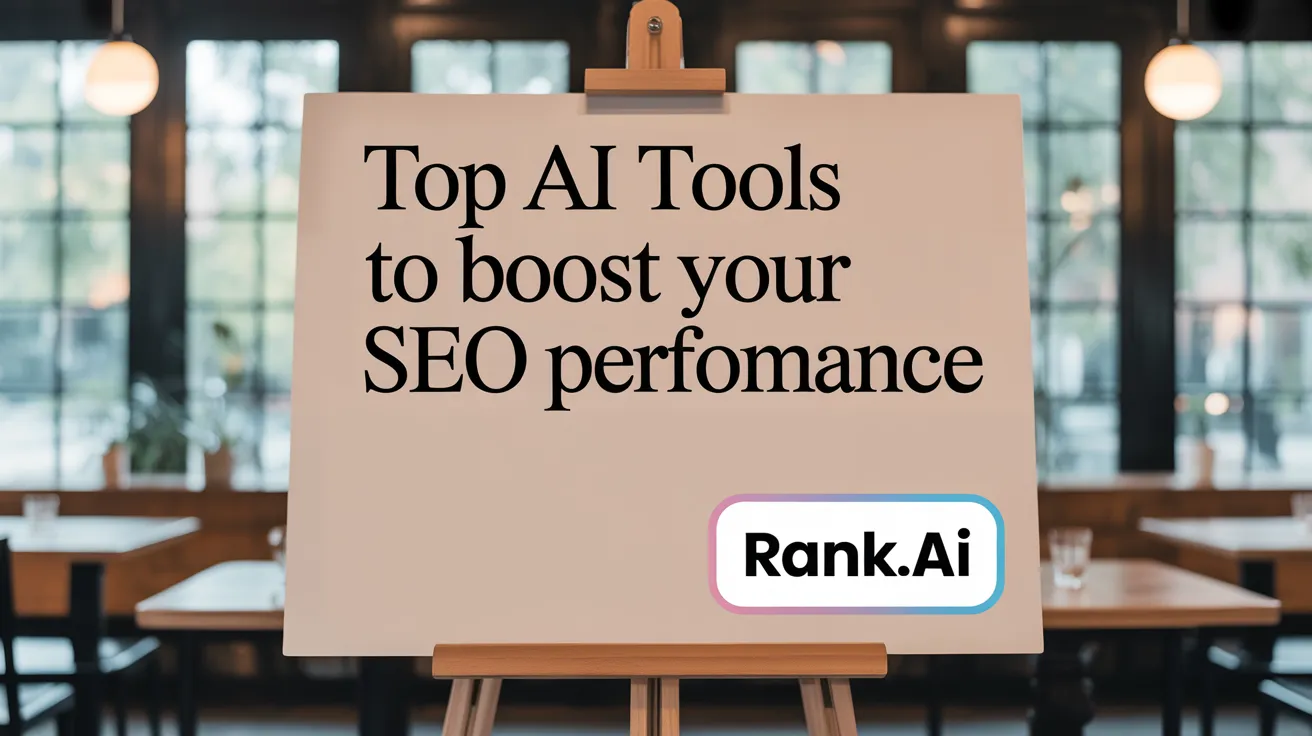
In today’s fast-evolving digital landscape, leveraging artificial intelligence (AI) tools has become crucial for optimizing SEO strategies effectively. Top platforms such as Semrush, Ahrefs, Clearscope, and Writesonic are at the forefront, offering a suite of functionalities designed to automate and refine critical SEO tasks.
These tools streamline activities like keyword research by analyzing vast datasets to identify high-value, relevant, and long-tail keywords that match user intent and search trends. For content creators, AI-powered content generation tools assist in producing optimized drafts, topic outlines, and FAQs, drastically reducing production time while maintaining quality.
Technical audits, another vital aspect of SEO, are enhanced through AI-driven site analysis. Tools like Semrush’s Site Audit and Ahrefs’ site explorer automatically identify issues related to site speed, crawlability, and metadata, providing actionable recommendations for improvements.
Monitoring search engine algorithm changes is essential for maintaining and improving search rankings. AI tools help detect shifts in ranking factors and adapt strategies accordingly, ensuring that websites remain competitive in dynamic search environments.
Furthermore, these platforms facilitate backlink analysis and competitor research, helping identify authoritative sites for link building and uncovering market gaps. Local SEO efforts are also supported with AI insights that optimize Google My Business profiles and manage reviews.
Overall, integrating AI tools into SEO practices empowers marketers to achieve faster insights, automate routine tasks, and adapt proactively to algorithm updates. This results in more targeted strategies, higher rankings, and sustained growth in organic traffic.
For those seeking to enhance their SEO performance with AI, a comprehensive understanding of the top tools available—such as Semrush, Ahrefs, Clearscope, and Writesonic—can provide a significant competitive advantage in achieving measurable results.
Leveraging AI for Content Research, Keyword Optimization, and Gap Analysis
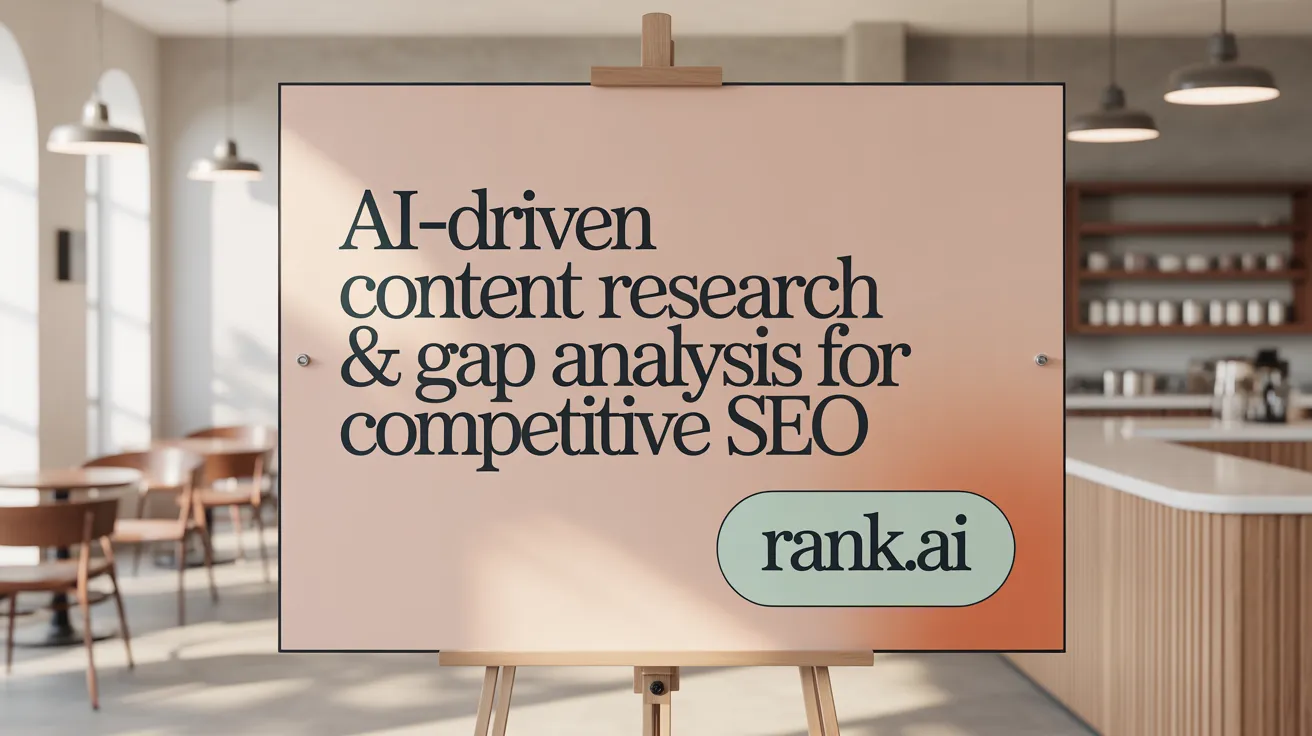
AI has become an indispensable tool in modern SEO for discovering trending and long-tail keywords, which are critical for capturing niche markets and aligning content with user intent.
Through advanced machine learning algorithms and natural language processing (NLP), AI can analyze vast data sources—from search engine queries to social media trends and competitors’ strategies—to identify high-potential keywords. This includes not only popular keywords but also emerging search terms that are gaining traction, enabling marketers to stay ahead of the curve with AI-driven keyword research and search trends analysis.
Identifying content gaps and emerging trends is another vital function of AI. By conducting comprehensive content audits and tracking search query fluctuations, AI tools reveal areas where existing content underperforms or where new opportunities exist. This proactive approach helps in creating targeted content that fulfills unmet user needs and boosts rankings through content optimization with AI.
Semantic analysis further enhances SEO efforts by understanding user intent behind various search queries. AI-powered platforms evaluate the context and meaning of keywords in conjunction with related concepts to facilitate personalized content targeting. This ensures that content resonates more effectively with specific audience segments, increasing engagement and conversions through personalized search experiences.
Overall, AI significantly streamlines content research and optimization processes. It provides actionable insights that keep strategies agile in a rapidly evolving digital environment. From automating routine keyword discoveries to predicting search trend shifts, AI empowers businesses to optimize their content effectively and maintain a competitive edge in search rankings.
AI's Influence on Content Marketing Strategies and SEO Integration
How does AI influence content marketing strategies and content SEO?
AI plays a transformative role in shaping content marketing and SEO approaches. It enables marketers to develop highly personalized and targeted content by analyzing vast amounts of data to understand user preferences and search intent. This predictive modeling allows businesses to anticipate future trends and tailor their content to meet evolving customer needs.
One of AI's major contributions is automating core SEO tasks, including keyword research, content generation, and technical site audits. AI-driven tools like Semrush, Surfer SEO, and ChatGPT facilitate the rapid production of optimized, high-quality content while ensuring alignment with search engine algorithms such as Google’s RankBrain and BERT.
Emerging AI trends further influence strategies: voice search optimization is increasingly vital as AI-powered voice assistants grow in popularity. Real-time analytics enables instant content adjustments based on current trends or user interactions, enhancing engagement and visibility.
Furthermore, AI improves technical SEO processes like schema markup creation, internal linking automation, and performance monitoring. These developments enable more efficient workflows, reduce manual effort, and lead to smarter decision-making.
Overall, AI's integration into content marketing and SEO results in more relevant, engaging content that resonates with audiences and improves ranking performance. It allows marketers to focus on strategic, creative activities while automation handles routine and data-intensive tasks.
Forecasting Algorithm Changes and Industry Shifts with AI
How can AI forecast search engine algorithm changes and industry shifts?
AI plays a crucial role in predicting future changes in SEO algorithms and industry dynamics by leveraging extensive data analysis and machine learning techniques. Advanced AI systems scrutinize massive datasets—ranging from search engine logs and user interactions to market signals and emerging technologies—to uncover patterns and trends that signal upcoming shifts.
Predictive analytics tools, such as those integrated within platforms like Semrush, BrightEdge, or MarketMuse, continuously monitor real-time search behavior, keyword performance, and content engagement metrics. These insights help identify subtle signals indicating a potential algorithm update or industry trend. For example, increases in certain types of user queries or sudden shifts in content popularity can be early warning signs.
Natural language processing (NLP) and large language models (LLMs) further enhance forecasting by understanding the semantic evolution of search queries. As search intent and user preferences evolve, AI models can anticipate how search engines like Google might adjust their ranking factors—such as emphasizing semantic relevance or multimedia content.
Moreover, AI assesses external industry signals—such as technological innovations, regulatory changes, and consumer behavior shifts—by analyzing news, social media, and market reports. This comprehensive analysis allows for a broader view of industry movements before they fully materialize.
By integrating these predictive insights, marketers can proactively refine their SEO strategies—adjusting content focus, optimizing technical SEO, and exploring new content formats—before changes take full effect. This forward-looking approach helps maintain or improve search visibility, giving businesses a competitive edge in the ever-evolving digital landscape.
Adapting SEO Strategies for AI-Driven Search and Ranking Factors
As AI-driven search becomes increasingly prevalent, adapting SEO strategies is crucial for maintaining visibility and competitiveness. Central to this adaptation is emphasizing the importance of E-E-A-T principles—experience, expertise, authoritativeness, and trustworthiness. Creating content that thoroughly demonstrates these qualities helps establish credibility in the eyes of both users and AI algorithms.
Optimizing for natural language and conversational keywords is also vital. With AI models like Google's BERT and RankBrain interpreting complex, nuanced queries, content should be structured around long-tail keywords and natural language phrases that reflect how real users ask questions. Incorporating FAQs, detailed answers, and clear headers can improve the chances of being featured in snippets and AI responses, as highlighted in AI and SEO transformation.
Technical SEO enhancements are equally essential. Ensuring a website’s Core Web Vitals—loading speed, interactivity, and visual stability—are optimized helps support AI and search engine algorithms in crawling and understanding your site. Implementing schema markup and structured data further communicates content relevance, enabling AI models to better interpret and cite your pages.
Content organization must be clear and skimmable, with key insights placed upfront to align with AI’s preference for direct, high-quality information. Moreover, leveraging AI-powered SEO tools for technical audits, content creation, and personalized user experiences can create significant advantages in the evolving landscape.
In summary, successful adaptation involves rigorous focus on authoritative, high-quality content, optimization for conversational search, and technical excellence—all supported by emerging AI tools to stay ahead of algorithm changes and search trends.
Staying Ahead with AI Insights in the Evolving SEO Landscape
AI insights are fundamentally transforming how digital marketers navigate the constantly changing world of SEO and industry trends. By harnessing predictive trend analysis and sophisticated user behavior segmentation, marketers can anticipate shifts in search patterns and consumer preferences before they become mainstream. This proactive approach allows for the strategic adjustment of content creation and targeting efforts, ensuring brands remain relevant and visible in competitive markets.
One of the major advantages of AI-driven insights is their ability to tailor content optimization and campaign targeting on an individual level. Using AI tools, marketers can analyze vast amounts of data to identify what resonates with different audience segments. This results in highly personalized content that enhances user engagement, fosters brand loyalty, and increases conversion rates. For example, utilizing AI algorithms, businesses can generate customized messaging for different demographic groups, optimize keywords that match user intent, and dynamically adapt marketing strategies based on real-time data.
However, as AI becomes more integral to SEO and marketing efforts, balancing automation with ethical AI use is critical. While automation can significantly boost efficiency—automating technical SEO tasks, content suggestions, and data analysis—it's essential to maintain transparency and uphold standards that prevent bias or misinformation. Ethical AI practices involve ensuring data privacy, avoiding manipulative tactics, and providing clear disclosures when AI-generated content is used.
In sum, leveraging AI insights allows digital marketers to stay ahead by making data-driven decisions, personalizing user experiences, and maintaining ethical standards. This combination positions brands to effectively navigate the future of SEO, adapt to emerging industry trends, and build long-term trust with their audiences.
Predicted AI SEO Trends for 2025 and Beyond
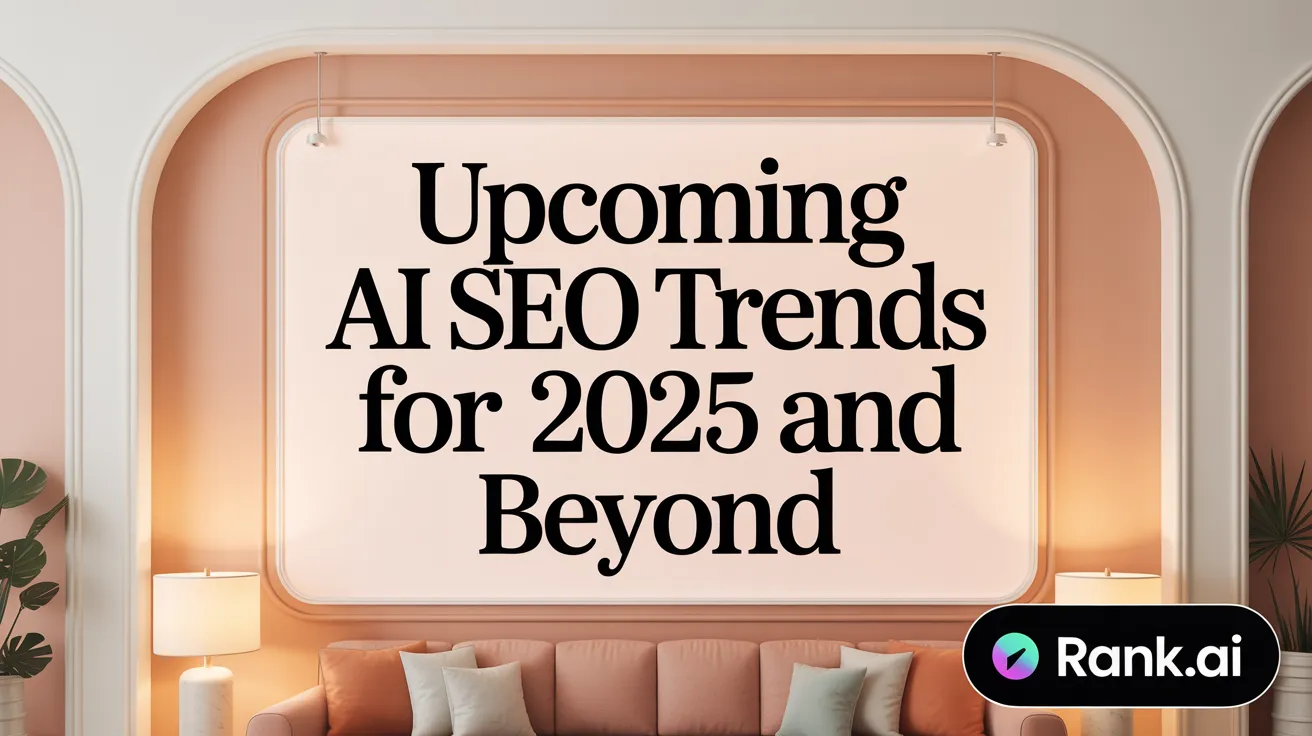
What are the predicted AI SEO trends for 2025 and beyond?
In 2025, AI continues to reshape the landscape of search engine optimization, bringing new dynamics and strategies for visibility and engagement. One of the most noticeable developments is the increasing integration of AI Overviews and answer engines like Google’s AI Mode, Perplexity, and ChatGPT. These tools are now appearing in roughly 15% of Google search results, providing instant, comprehensive answers that reduce the necessity of clicking through multiple links. As a result, organic click-through rates are declining by over 30%, a trend sometimes called "The Great Decoupling", emphasizing the need for marketers to adapt.
AI-driven content creation and technical optimization tools significantly enhance efficiency, enabling faster content output, better keyword analysis, and smarter site audits. The use of machine learning algorithms to interpret user intent and semantics means that SEO is shifting from traditional keyword matching to intent-based and context-rich content strategies aligned with Google's E‑E‑A‑T (Experience, Expertise, Authority, Trustworthiness) guidelines.
Furthermore, the importance of multimedia, especially video content, is on the rise, with platforms like YouTube becoming critical components of SEO strategies (SEO Trends 2025). Local SEO also gains a heightened focus as businesses optimize for geographic relevance and leverage reviews and local citations to improve visibility (AI in Content Marketing and SEO). Additionally, building credible, authoritative content that establishes topical relevance and demonstrates thought leadership remains key to thriving in an AI-dominant search environment (Adapting SEO for LLMs and AI search).
Overall, SEO in 2025 is increasingly personalized, more dependent on AI tools, and prioritizes quality, user engagement, and conversions over simple rankings and volume. Marketers need to diversify their tactics, embrace automation responsibly, and focus on creating high-value, authoritative content to stay ahead in this evolving landscape (Future of SEO and AI).
Improving SEO Performance with AI-Based Predictive Analytics
AI-driven predictive analytics has become an essential tool for businesses aiming to stay competitive in the rapidly changing landscape of search engine optimization. By analyzing vast datasets from historical search data, industry trends, and external factors, AI models can forecast fluctuations in search volume and content demand. This proactive approach enables marketers to tailor their content strategies, optimize keywords, and plan campaigns around upcoming trends, ensuring their efforts are timely and relevant.
One of the significant advantages of AI-based predictions is anticipating future algorithm updates from major search engines like Google. These models can identify potential shifts in ranking factors and suggest adjustments to maintain or improve rankings quickly. Additionally, AI tools can uncover new backlink opportunities by analyzing competitor link profiles and predicting high-value sites for outreach.
Popular tools such as Google Analytics 4 (GA4), Semrush, and Ahrefs now incorporate predictive features that analyze user behavior, market movements, and search patterns. For example, GA4 uses predictive metrics to forecast potential user actions, while Semrush and Ahrefs provide insights into keyword performance and backlink prospects before they happen.
How can AI-based predictive analytics improve SEO performance and competitiveness? This technology interprets large datasets to identify emerging trends and demand cycles, allowing businesses to optimize their content in advance. It also predicts the effects of algorithm changes, enabling quick adaptations that prevent ranking drops. Furthermore, by foreseeing backlink opportunities and content rankings, AI predictions streamline resource allocation, focusing efforts where they are most likely to succeed.
Integrating AI insights into SEO strategies helps organizations prioritize high-impact actions, personalize content for different user segments, and stay ahead of the competition. With these tools, businesses can better understand market dynamics, reduce manual guesswork, and make data-driven decisions that enhance visibility and engagement in an increasingly crowded digital environment.
In summary, AI-based predictive analytics empowers businesses to anticipate changes, allocate resources effectively, and maintain a competitive edge—an essential advantage in today’s fast-evolving SEO landscape.
Effective Integration of AI Tools into Digital Marketing and SEO Workflows
Integrating AI tools into digital marketing and SEO strategies requires a thoughtful approach to maximize benefits and maintain ethical standards. The first step is selecting suitable AI technologies tailored to specific goals such as content creation, data analytics, keyword research, or customer segmentation. Popular tools like ChatGPT assist in generating high-quality content efficiently, while platforms like Surfer SEO optimize on-page elements and improve search rankings.
Once the right tools are identified, organizations should invest in team training to develop AI literacy, enabling staff to understand how to interpret AI-driven insights and automate routine tasks effectively. This not only boosts productivity but also ensures that AI complements human creativity and decision-making.
Monitoring and regularly optimizing these AI implementations is critical. Continuous assessment of AI outputs ensures that content remains relevant, accurate, and aligned with brand voice. Maintaining transparency about AI usage, especially regarding data privacy and bias, fosters trust with users and adheres to ethical standards.
Moreover, leveraging AI for predictive analytics helps anticipate search trends and customer behaviors, allowing proactive strategy adjustments. Incorporating structured data, schema markup, and AI-powered features like featured snippets enhances visibility and aligns with search engine evolutions.
Staying adaptable by experimenting with emergent AI innovations enables organizations to remain competitive. This includes integrating AI in personalized user experiences, real-time SERP analysis, and advanced automation workflows. With deliberate planning, ongoing training, and ethical oversight, AI can substantially improve digital marketing and SEO effectiveness, delivering faster results and higher ROI.
Using AI-Generated Content Within Google's Search Quality Standards
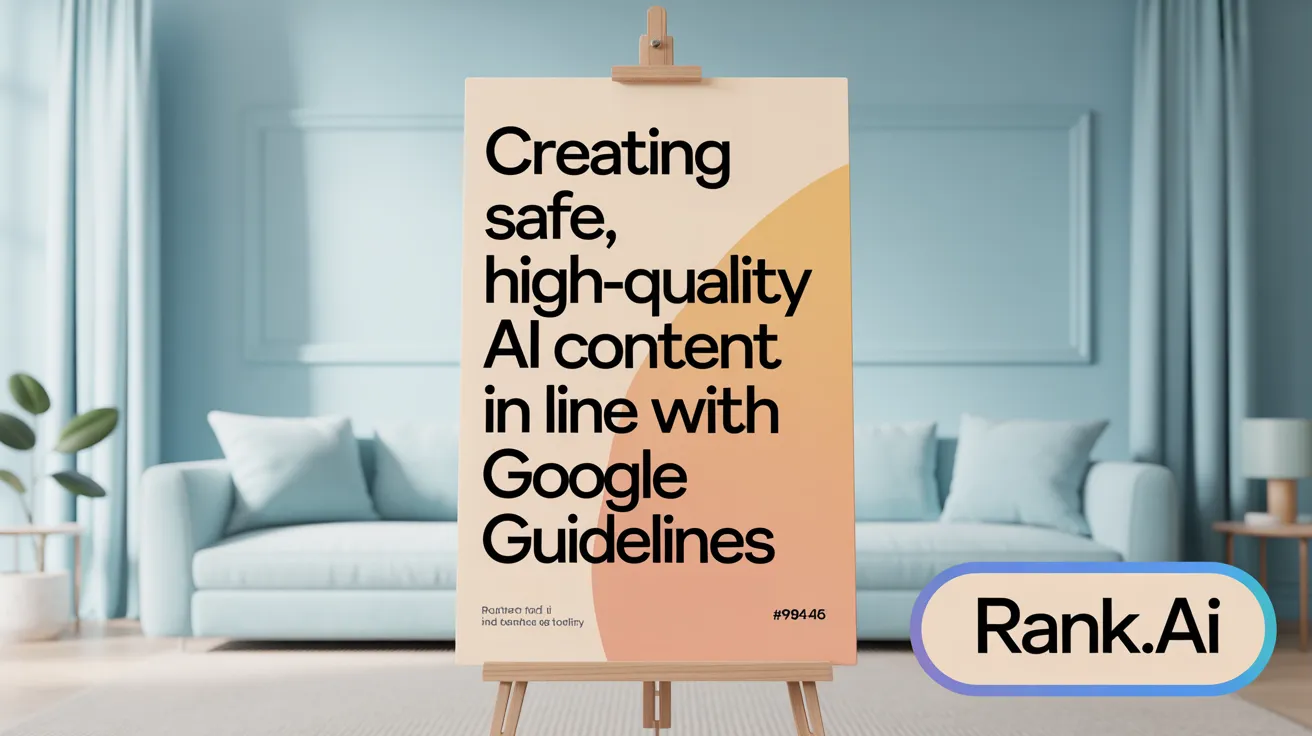
AI-generated content can be incorporated into websites while respecting Google's search quality guidelines by focusing on originality, usefulness, and the demonstration of expertise, experience, and trustworthiness, often summarized as E-E-A-T.
Google emphasizes that the quality of content—not just the method of creation—determines its ranking potential. As long as AI-produced content is helpful, informative, and aligns with user intent , it can meet Google's standards. Content creators should avoid producing mass-produced, low-value pages that serve no real purpose or deliver little to no benefit to users.
Transparency plays a role, but it is not an automatic safeguard. Proper disclosures about AI involvement—such as indicating when AI tools are used to generate content—are recommended, especially in contexts where transparency is expected by users. However, disclosures alone do not ensure compliance; the core focus should be on producing accurate, well-researched, and valuable content.
Furthermore, Google penalizes manipulative tactics that attempt to use AI content to deceive or spam search rankings. Practices such as keyword stuffing, duplicate content, or creating content that lacks depth and clarity are discouraged. Instead, AI should be utilized responsibly—to assist in structuring content, providing factual data, or enhancing content quality—ensuring the final output prioritizes user experience.
Adhering to these principles helps align AI-generated content with Google's policies. The goal is to harness AI as a tool for augmenting high-quality, authoritative content that genuinely addresses user queries and offers real value. Responsible use, combined with human oversight and fact-checking, ensures that AI-enhanced content remains compliant and ranks well in search results.
For more detailed guidelines, search queries like 'Guidelines for compliant AI-generated SEO content under Google standards' provide a wealth of current advice from industry experts and Google’s official recommendations.
Emerging AI Technologies Reshaping SEO Practices
What upcoming technological developments involving AI are likely to reshape SEO practices?
Artificial intelligence continues to innovate the landscape of search engine optimization, bringing about transformative shifts driven by advanced content optimization, personalization, and trend prediction.
One of the most notable advancements is the integration of AI-powered tools such as Google’s Search Generative Experience (SGE), SEMrush, and Surfer SEO which enable businesses to analyze vast datasets and generate high-quality, SEO-friendly content rapidly. These platforms utilize machine learning and natural language processing (NLP) to decode user intent, understand semantics, and deliver results tailored to individual preferences.
The rise of voice and visual search technologies, is another pivotal development. AI-driven voice assistants and image recognition systems are enabling users to interact with search engines through natural language and images, necessitating a shift toward optimizing content for these modalities.
Future AI innovations include automated technical SEO audits that identify site issues in real-time, predictive analytics capable of forecasting algorithm updates and search trends before they happen, and sophisticated personalization engines that customize user experiences at an individual level.
While these advancements make SEO strategies more efficient and data-driven, they also introduce challenges in maintaining content quality, ensuring ethical AI use, and maintaining transparency. The development of AI systems that can autonomously generate and optimize content is reshaping how brands approach digital visibility.
In summary, ongoing AI integration in search engines and SEO tools promises a more adaptive, predictive, and user-focused future. Emphasizing automation and deep analytics, these innovations are unlocking new potentials for SEO practitioners aiming to stay ahead in an increasingly competitive digital environment.
Real-Time SEO Strategy Adjustments Enabled by Emerging AI Techniques
The landscape of search engine optimization (SEO) is evolving rapidly, driven by innovative AI methods that enable dynamic, real-time adjustments to SEO strategies. At the forefront are AI-powered analytics platforms, which continuously monitor search trends, competitor activity, and user behaviors. These platforms analyze vast datasets in real-time, providing marketers with instant insights that inform immediate action.
Natural Language Processing (NLP) and semantic analysis are critical AI techniques that interpret the nuances of search queries and content relevance. They allow AI tools to understand shifts in user intent and algorithm changes, ensuring that content remains optimized and aligned with current search expectations without manual intervention.
Automation plays a vital role as well, with AI-driven tools capable of updating on-page elements such as metadata, keywords, and content structure automatically. This rapid adaptation ensures websites maintain high relevance and visibility even as search engine algorithms and user preferences evolve.
Furthermore, AI applications are increasingly focusing on adapting to new and emerging search modalities like voice and visual search. By analyzing voice queries and image-based searches, AI helps optimize content for these formats, staying ahead of the trend shift.
Together, these emerging AI techniques enable businesses to make swift, informed decisions to enhance their SEO performance. The ability to react instantly to changing search dynamics not only maintains but also improves online visibility, ensuring they remain competitive in an increasingly complex search ecosystem.
Conclusion: Embracing AI for Future-Ready SEO Success
AI is proving indispensable for SEO professionals aiming to predict trends, optimize strategies, and maintain competitiveness in a rapidly evolving search environment. By harnessing AI's powerful analytical, predictive, and automation capabilities, marketers can create more relevant, authoritative content aligned with emerging search engine algorithms and user behaviors. Integrating AI tools thoughtfully and ethically within SEO workflows not only streamlines processes but also fosters creativity and strategic insight that machines alone cannot replicate. As AI technologies continue to advance, embracing these innovations will be essential for future-proofing SEO strategies, enhancing user engagement, and achieving sustained digital visibility in 2025 and beyond.
Table of contents
Recent articles
Fresh insights on AI and SEO to help you stay ahead of the curve.


Ready to Improve
Your Rankings?
Use our free tools to get instant insights into your SEO performance and discover opportunities to rank higher


